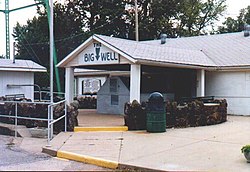Big Well (Kansas)
Greensburg Well | |
 Big Well visitor center. Well entrance is the gray structure at the left of the photo. Guests could view the well for free from a glass and steel structure under the portico. Visitor center destroyed by tornado on 4 May 2007. | |
| Location | Sycamore St., Greensburg, Kansas |
|---|---|
| Coordinates | 37°36′20″N 99°17′37″W / 37.60556°N 99.29361°W |
| Area | 1 acre (0.40 ha) |
| Built | 1887 |
| NRHP reference No. | 72000507[1] |
| Added to NRHP | February 23, 1972 |
The Big Well is a large historic water well in Greensburg, Kansas, United States. It was built in 1887 at a cost of $45,000 to provide water for the Santa Fe and Rock Island railroads, and it served as the municipal water supply until 1932.[2]
It is billed as the world's largest hand-dug well, at 109 feet (33 m) deep and 32 feet (9.8 m) in diameter.[3]
The Well of Joseph in the Cairo Citadel at 280 feet (85 m) deep and the Pozzo di S. Patrizio (St. Patrick's Well) built in 1527 in Orvieto, Italy, at 61 metres (200 ft) deep by 13 metres (43 ft) wide[4] are both actually larger.
It was designated a National Museum in 1972;[5] in 1973 it was awarded an American Water Landmark by the American Water Works Association.[6] Under the name of "Greensburg Well," it has been listed on the National Register of Historic Places (NRHP) since 1972.[7]
Visitors entered the well for a small fee, descending an illuminated stairway to the bottom of the well.[2]
Visitor center
The well had a visitor's center detailing the history of the well's construction. On May 4, 2007, a tornado hit Greensburg, destroying the center.[8] The well reopened on May 26, 2012.
The visitor's center also displayed a Brenham half-ton (1,000 lb, 450 kg) pallasite meteorite recovered from the area. The meteorite was billed as the world's largest single-piece pallasite,[9] but that title is held by other samples. It was reported that the Big Well visitor center was destroyed, and the meteorite was missing [10] on May 7, after an EF5 tornado destroyed the town. The meteorite, which was insured for $1 million, was later located underneath a collapsed wall and was displayed temporarily at the Sternberg Museum of Natural History in Hays, Kansas.[11] It has returned to the reconstructed museum site.
References
- ^ "National Register Information System". National Register of Historic Places. National Park Service. July 9, 2010.
- ^ a b Big Well official homepage
- ^ Other hand-dug wells are much deeper, such as the Woodingdean Well in Brighton, England, but the Big Well's diameter gives it a greater total volume.
- ^ St. Patrick's Well
- ^ Big Well on World's Largest Things
- ^ Water Landmarks from the website of the American Water Works Association
- ^ KANSAS - Kiowa County, Nationalregisterofhistoricplaces.com. Accessed 2008-10-23.
- ^ Evidence of the destruction is based on a Wichita Eagle/Associated Press photo published here on and hosted by CNN
- ^ Big Well Booklet, Chamber of Commerce, Greensburg, Kansas, written 1987, viewed 6 May 2007.
- ^ Greensburg loses unique town treasure too Archived September 30, 2007, at the Wayback Machine
- ^ Greensburg's famed meteorite found under rubble Archived May 9, 2007, at the Wayback Machine
External links
- Water wells
- Buildings and structures in Kiowa County, Kansas
- Museums in Kiowa County, Kansas
- Water supply infrastructure on the National Register of Historic Places
- Buildings and structures on the National Register of Historic Places in Kansas
- Infrastructure completed in 1887
- 1887 establishments in Kansas
- History of Kansas
- Visitor attractions in Kansas
- National Register of Historic Places in Kiowa County, Kansas


